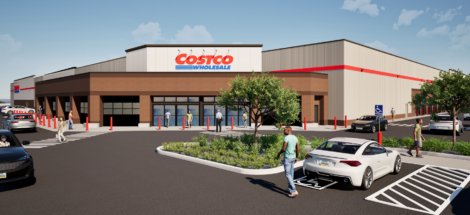
Kansas Turnpike has invested about $100M to go cashless; new Lawrence office to play big role in system

photo by: Chad Lawhorn/Journal-World
Steve Hewitt, chief executive officer for the Kansas Turnpike Authority, attended an opening ceremony for KTA's new Lawrence office on Oct. 24, 2024. Hewitt, right, was joined Kansas Department of Transportation Secretary Calvin Reed, left, and Kansas Senate President Ty Masterson, center.
Sometimes a big bet involves pushing all your cash into the middle of the table. But here’s a twist: Sometimes it involves forsaking all cash.
The Kansas Turnpike Authority has indeed done the latter. KTA has invested about $100 million in converting the state’s turnpike system into one that no longer accepts cash tolls.
And the authority is now betting big on Lawrence to make that cashless system work.
KTA leaders officially opened a new Lawrence office that will play a major role in serving turnpike customers who no longer stop at toll booths but rather get digital or mailed statements telling them how much they owe in tolls.
The new service center is in the I-70 Business Center, which is across the street from the North Lawrence turnpike interchange, and next door to the Journal-World offices. The center serves as a walk-in customer service location for people who want to pay a KTA bill or who want to get a KTag sticker for their vehicle, which gives motorists a 50% discount on the tolls they are required to pay.
The Lawrence location, though, also serves as a call center to help customers who call in with a question about their bill or need other assistance. The center currently has 13 employees, but already is set up to expand to about 25. There’s additional space that could be arranged to accommodate even more employees, KTA officials said.
Growth is in the forecast for the location. The KTA will begin providing service to an entirely new toll road in 2026. When construction work is completed on the U.S. 69 project in Overland Park, that highway will include tolled express lanes between 103rd and 151st streets in Johnson County. KTA will be responsible for collecting those tolls, and the authority opened the Lawrence office with the idea that it will provide the customer support for that project, Steve Hewitt, chief executive officer for the KTA, said.
Hewitt told the Journal-World in a brief interview that the conversion to a cashless tolling system has gone well since it was introduced in July. He also told the Journal-World the investment in the system — everything from the license plate readers to the software systems to the demolition of toll booths — will total about $100 million.
He said the Kansas Turnpike Authority had enough funds in reserve to cover those expenses, and he said KTA leaders are confident it will be a good investment.
“It is safer and it is more efficient,” he said. “It will be really good for our future.”

photo by: Chad Lawhorn/Journal-World
The front window of the new Kansas Turnpike Authority office in Lawrence is shown on Oct. 24, 2024.
Hewitt is projecting it will have positive impacts on future rates, too. He said the cashless system is producing savings for the turnpike authority in two main areas — personnel costs and maintenance costs.
On the personnel costs, fewer employees are needed as there are no longer toll booths to staff or to collect millions of dollars in bills and change from. Over the last five years, Hewitt said the KTA has shrunk its workforce by about 100 employees, mostly through attrition as many of the toll booth workers reached retirement age.
In terms of lower maintenance costs, that one may be less intuitive. But Hewitt said the savings are significant now that the authority no longer must maintain all the toll booths. Although the structures weren’t big, they were critical pieces of infrastructure that still had to be heated, cooled and maintained much like any other building.
Hewitt is now betting that the investment in cashless tolling will pay off by creating a system that produces enough money to maintain the roadway system — which stretches from Kansas City to Topeka to Wichita — while allowing KTA to avoid big increases in toll rates in the future.
“Our mission and vision is to have one of the most affordable roads in the country,” Hewitt said. Hewitt said that current data indicates that the KTA’s cashless rate of 4.8 cents per mile for a standard vehicle is the lowest rate in the U.S. among all turnpike systems that are using a cashless process.
Not all users of the Kansas Turnpike, however, are getting that rate. It is only available to motorists who have one of the KTag stickers on their windshield. That sticker, which is read by equipment installed along the turnpike, makes the tolling process much easier when compared to KTA having to rely on the license plate of a vehicle in order to identify where to send the toll statement. As a result, motorists with a KTag sticker get a 50% discount on their tolls compared to users without a KTag.
The new Lawrence office — open 8 a.m. to 5 p.m. Monday through Friday — is one of the KTA locations that process the requests for those KTag stickers, and Hewitt said business has been busy as word gets out about the discount.
“KTags have been going out the door pretty fast,” he said.

photo by: Chad Lawhorn/Journal-World
The Kansas Turnpike Authority office in the I-70 Business Center in North Lawrence is shown on Oct. 24, 2024.







